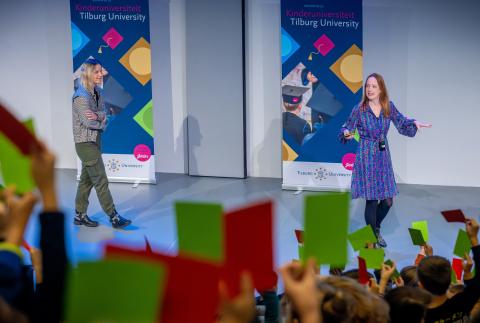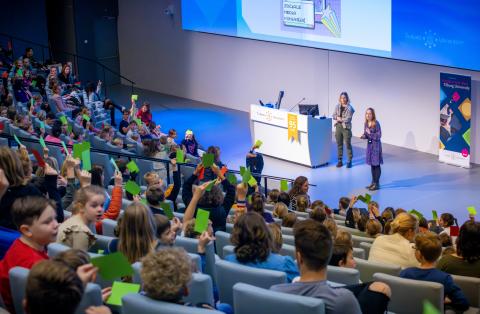New series of Junior University lectures kicks off
On October 25, a new series of Junior University lectures, an initiative of Tilburg University Junior, kicked off with an inspirational lecture on social media and influencers. In a packed lecture hall, no fewer than 530 children aged 9 to 12 experienced what it feels like to be university students. Through such lectures, children are introduced to science and learn about the impact research has on their lives.
The lecture was taught by researchers Anne-Mette Hermans (TSB) and Ini Vanwesenbeeck (TSHD). They spoke passionately about the research at the university into social media and influencers. What positive and negative effects do social media have on children? Sure, it’s nice to meet friends online, but there is a downside. Online everything looks perfect, but is it? The two researchers answered these and related questions in their Junior University lecture – the first of its kind to be given in CUBE Building.
Eager beavers
Afterwards, both researchers enthused about the lecture. Anne-Mette: “I felt it really added value. There was a very special energy. The children were wonderfully enthusiastic and were eager to join in and think along. In ‘normal’ lectures that’s rare.” Ini concurs: “It was amazing. We could see the children nod and consider every question we asked. It shows that children that age can think about important topics and I hope they continue to do so as they grow up.”


The pluses and minuses of social media
The two researchers also felt it was relevant to show their audience both the pluses and the minuses of social media. Ini: “Children hear a lot about what’s good and bad about social media. That’s why it’s a good thing to show them that while using social media is fun, there’s a downside to it. Mind you, children often are aware already.” Anne-Mette adds: “If we can make children critically reflect on how they use social media and on its negative effects, then that has real value.”
At the end of the lecture, it was the children’s turn to ask questions of the lecturers. Ini: “They had many questions about how we ourselves use social media. Just as well, really, because it meant we had to admit that we, too, are often on social media a bit too long. One student asked us how he could apply the tips we gave to become more aware of using social media while scrolling. This shows that children are aware how hard it is to resist the temptation of social media.”
The two researchers hope that what the children take away from their lecture is that perfection is no recipe for happiness. Ini: “I hope that our ‘students’ now realize that social media are a fun extra for real life. And that it’s good to do without social media for a day every once in a while, and to follow influencers they can relate to, because picture perfectness leads to unhappiness.”
Children connect with science
Both researchers endorse the idea of involving children in science. Ini: “It’s cool that they can connect with science this way. Junior University lectures show children that social media platforms aren’t just fun but also studied by scientists. And who knows, it might just inspire them to study social media themselves if and when they go to university.” Anne-Mette: “They are the scientists of the future. The university must welcome people from various background, and the Junior University lectures is a fun way for children to be introduced to the university. It is not an ivory tower; it also fosters research that concerns children. Now they’ve experienced university and have seen that just like other people researchers often spend a bit too much time on social media.”
Two young visitors, Rosa and Isabelle, both nine years of age, said they learned a lot: “Today we learned that social media can be addictive, as can phones. We liked the tips about giving up or preventing these addictions.”
Watch the lecture here:
-

Anne-Mette Hermans
Assistant ProfessorAnne-Mette Hermans is Assistant Professor at Tranzo, Tilburg University’s scientific center for care and well-being. Her primary research focus is on online beauty ideals and she specializes in the psychological and social aspects of cosmetic surgery.
-

Ini Vanwesenbeeck
Assistant ProfessorIni Vanwesenbeeck is Assistant Professor with the TSHD Department of Communication and Cognition. Within the Center for Social Influence research group she explores how influencers have an effect on their followers’ behavior.
Tilburg University Junior
The annual series of Junior University lectures (in Dutch) are organized by Tilburg University Junior. These lectures are among several events and programs Tilburg University Junior organizes for children aged 9 to 14. The aim of these activities is to introduce science and the university to children in a way that is fun and engaging.
